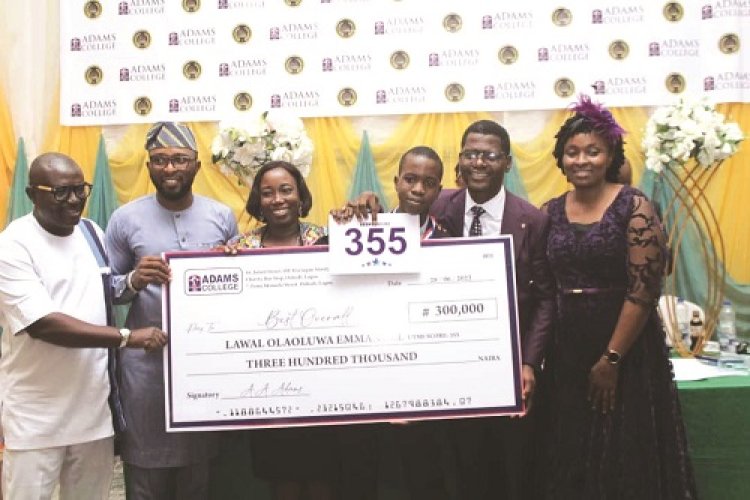How we scored over 300 out of the 400 marks in 2022 JAMB UTME
How we scored over 300 out of the 400 marks in 2022 JAMB UTME, Many of the 110 students who scored over 300 out of the 400 marks share their stories

It used to be called ‘Almighty JAMB’. But more students are finding that with the right preparation, especially help from tutorial colleges, getting a high score in the Unified Tertiary Matriculation Examination (UTME) is attainable. Many of the 110 students who scored over 300 out of the 400 marks share their stories with ROBERT EGBE and EMMANUEL OCHAYI.
Seventeen-year-old Alvin Ezeocha remembers the atmosphere in his Ajao Estate neighbourhood in Lagos whenever the Joint Admission and Matriculation Board releases its Unified Tertiary Matriculation Examination (UTME) results.
Students who scored as high as 230 out of the maximum 400 marks available, felt on top of the world. It was a good performance, or so he used to think. Until he enrolled for tutorial classes this year and was challenged by the stories of others before him, who excelled in UTME after seeking tutorial help. This move paid off. When the result for this year’s UTME was released on May 14, Ezeocha scored 346.
Ezeocha’s feat becomes even more memorable against the backdrop of students’ general poor UTME performances across the country in 2021. JAMB Registrar, Is-haq Oloyede, on July 4, 2021, said students’ UTME performances were poorer than what was recorded in the past three years prior or thereabouts.
Oloyede spoke during an appearance on “Weekend File”, a live programme of the Nigerian Television Authority (NTA).
According to the registrar, the percentage of those who scored 120 and above out in 2021 was 99.65 of the entire candidates but the figure stood at 99.80 in 2020.
He said: “In 2018, it was 99.99 per cent, but in 2019 it dropped to 99.92.
“Also, in 2020, 69.82 per cent of the candidates who sat for the UTME scored 160 and above but in 2021, it reduced to 65.62 per cent.”
110 from same college score above 300
Ezeocha was not alone in acing the UTME. 109 other students who also took tutorials with him at Adams International College, Oshodi, Lagos, also scored above 300 in this year’s UTME.
Speaking at an award ceremony organised by the college, they told The Nation that the institution’s inspirational teaching methods, among others, aided their feat.
Overall best student for the college’s UTME class for the year was 16-year-old Emmanuel Lawal, who scored 355.
“I feel very happy that even words cannot explain it. I did not really believe I would get this far. I was expecting a score of around 320. But when I checked my result, I was surprised. This college really helped me. To admit, I was not really good at English. But this college helped me to become better in subjects I was not good at. My score would not have been this good if not for them,” Lawal said.
Ezeocha, who was next, rated the college’s standards very high, saying it motivated him to stretch himself.
He added: “When I came to Adams, I saw 343 as the highest and I was intrigued because in my area, people scored 230 and above and they were happy. Mr Adams (Adams International College Proprietor, Adams Adebola) and the teachers were always inspiring. I will advise those preparing for UTME to come to Adams.”
Tobi Olarenwaju, 17, who scored 344, explained how excited he was to have attained such height.
“I feel great. I feel honoured to be among the top five. I feel very happy and excited. When I started the JAMB class, this was not my initial target. But with time, I realised that it was what I could achieve if I just had the right mind,” Olarenwaju said.
Perhaps the most remarkable of the 110 was Jibolabi Owolabi.
Owolabi, 21, scored a relatively low 304 but was one of the two students who received a standing ovation at the event because of their inspirational stories.
He started as an Arts student, but in Junior-Senior Secondary, was made to enrol as an apprentice auto mechanic. He continued learning the trade-up till after he left secondary school.
He said: “After I graduated from Senior Secondary School in 2018/2019, I thought I could do something big that people couldn’t really imagine. I told my mum I wanted to switch to sciences to study mechanical engineering. And she supported me with everything she had.
“I was learning auto mechanics at a shop from SS1 down to SS3 before I graduated. I love doing the work. I did not want to leave it. I told everyone I wanted to study mechanical engineering and the only way was for me to switch from Arts to Sciences. But there was no time for me to go back to secondary school. Then I heard about Adams College. I will be clocking one year and six months of being a science student, this year.”
Owolabi explained how he overcame discouragement, doubt and the need to stop working so he could focus more on reading.
He said: “I feel very very excited that I proved everyone wrong. While I was preparing, people asked me ‘Owolabi are you out of your senses?’ Even some that we graduated together in 2019.
“I just had to delete my WhatsApp, not coming online, because of different opinions of people. They said things like ‘After the stress you went through in secondary school you still want to go through that again?’ I just told them that I had a dream.”
Some advised that “Instead of going back, you can do any course in the university.’ But I was one of the best students in school; I knew mathematics very well. I felt I just needed to focus on my reading.
“I stopped going to the workshop during this period; I dedicated 80 per cent of my time to reading. I read at night and in the evening. Sometimes I stayed back at the college to study till around 6 or 7 pm after classes had ended by 3pm. The set of people I met there really encouraged me that I could do better.
Zero-tolerance for examination malpractice
Adams International College Proprietor, Adams Adebola, praised their achievements, saying it reinforced the school’s decision not to compromise its mission “to raise resourceful and quality future leaders through unwavering zero tolerance for examination malpractice.”
Adebola said: “We are glad to appraise you that ever since we initiated the awards ceremonies, the records have shown that the performances have continuously witnessed a steady boost. This year, to the glory of the Almighty, we have well over 110 students who scored over 300, which is our benchmark for eligibility for the award. We can proudly say we have 344, 346 and 355. Those who follow the records yearly will discover that two of our students went beyond the last feat recorded in the year 2021.”
The college’s Administrator, Mrs. Adenimpe Adams whose birthday was coincidentally on the same day, thanked the “wonderful parents” for believing in the school and praised the teachers for their dedication to the students.
Reminding the students of the challenges ahead, she predicted that “with determination, they were going to succeed.”
Ehimen Felix, a 15-year-old student of the Barachel Model College, Agbado, Oke-Aro, Lagos also performed creditably in the exam.
Felix, who is aiming to study Computer Science at the University of Lagos, boasts of an excellent score of 91 in Mathematics, 72 in Physics, 70 in Chemistry and 67 in English Language.
He also aced his West African Senior Secondary Certificate Examination (WASSCE) with A1 in Further Mathematics; B3 in five other subjects and two credits.
He hails from Esan West Local Government Area of Edo State.
After UTME, what next?
According to JAMB, about 1.7 million candidates sat the 2022 UTME exercise across the country.
The board conducts the UTME to grade candidates for admissions to undergraduate programmes of tertiary institutions in Nigeria —universities, polytechnics and monotechnics.
However, conquering UTME is one thing, gaining admission to a higher institution is another.
Only a fraction of the students who score above 200 gain admission to tertiary institutions.
For instance, 3,135 UTME and Direct Entry examinations candidates who scored 300 and above in 2018, 2019 and 2020 did not gain admission into tertiary institutions.
The figure is based on the admission statistics prepared by JAMB for the three years.
The statistics for 2018, 2019 and 2020 were made available on the board’s website.
In 2018, JAMB noted that though a total of 4,683 candidates scored 300 and above, only 3,683 gained admission while 1,000 candidates were unable to gain admission.
In 2019, a total of 2,967 candidates scored 300 and above, while 2,288 candidates got admitted 679 were denied admission.












